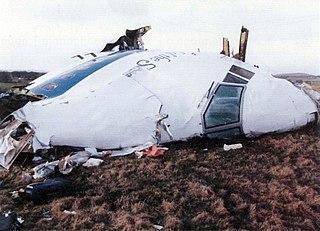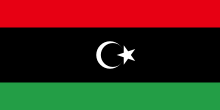
Libya, officially the State of Libya, is a country in the Maghreb region of North Africa. Libya borders the Mediterranean Sea to the north, Egypt to the east, Sudan to the southeast, Chad to the south, Niger to the southwest, Algeria to the west, and Tunisia to the northwest. Libya comprises three historical regions: Tripolitania, Fezzan, and Cyrenaica. With an area of almost 1.8 million km2 (700,000 sq mi), it is the fourth-largest country in Africa and the Arab world, and the 16th-largest in the world. Libya claims 32,000 square kilometers of southeastern Algeria, south of the Libyan town of Ghat. The country's official religion is Islam, with 96.6% of the Libyan population being Sunni Muslims. The official language of Libya is Arabic, with vernacular Libyan Arabic being spoken most widely. The majority of Libya's population is Arab. The largest city and capital, Tripoli, is located in northwestern Libya and contains over a million of Libya's seven million people.

Tripoli is the capital and largest city of Libya, with a population of about 1.183 million people in 2023. It is located in the northwest of Libya on the edge of the desert, on a point of rocky land projecting into the Mediterranean Sea and forming a bay. It includes the port of Tripoli and the country's largest commercial and manufacturing center. It is also the site of the University of Tripoli.

Muammar Muhammad Abu Minyar al-Gaddafi was a Libyan revolutionary, politician and political theorist who ruled Libya from 1969 until his killing in 2011 by rebel forces. He first served as Revolutionary Chairman of the Libyan Arab Republic from 1969 to 1977 and then as the Brotherly Leader of the Great Socialist People's Libyan Arab Jamahiriya from 1977 to 2011. Initially ideologically committed to Arab nationalism and Arab socialism, Gaddafi later ruled according to his own Third International Theory.

The Libya national football team represents Libya in men's international association football and it is controlled by the Libyan Football Federation. The team has never qualified for FIFA World Cup but has qualified for editions of Africa Cup of Nation in 1982, 2006, and 2012. In 1982, the team was both the host and runner-up. In the Arab Cup, Libya finished second in 1964 and 2012, and third in 1966. The team is affiliated with both FIFA and Confederation of African Football (CAF).

Saif al-Islam Muammar al-Gaddafi is a Libyan political figure. He is the second son of the late Libyan leader Muammar Gaddafi and his second wife Safia Farkash. He was a part of his father's inner circle, performing public relations and diplomatic roles on his behalf. He publicly turned down his father's offer of the country's second highest post and held no official government position. According to United States Department of State officials in Tripoli, during his father's reign, he was the second most widely recognized person in Libya, being at times the de facto prime minister, and was mentioned as a possible successor, though he rejected this. An arrest warrant was issued for him on 27 June 2011 by the International Criminal Court (ICC) for charges of crimes against humanity against the Libyan people, for killing and persecuting civilians, under Articles 7(1)(a) and 7(1)(h) of the Rome statute. He denied the charges.

On 7 July 2012, the National Transitional Council, in power since the Libyan Civil War, supervised democratic elections for a 200-member General National Congress to replace the Council. The assembly was to choose a prime minister and organize parliamentary elections in 2013. A process to write a constitution was also to be determined. Unrest driven by armed militias, ethnic minority and radical groups undermined the process and the government for the years following the overthrowing of Muammar Gaddafi. While internal apathy towards democratic reforms slowed the process, external bodies such as the European Union were still pressing for the establishment of a national dialogue to build consensus for the drafting of a new constitution to take place before the end of 2014. Parliamentary elections were scheduled to be held on 25 June 2014 in a move aimed at stabilizing the country and quelling the unrest.

Pan Am Flight 103 (PA103/PAA103) was a regularly scheduled Pan Am transatlantic flight from Frankfurt to Detroit via a stopover in London and another in New York City. The transatlantic leg of the route was operated by Clipper Maid of the Seas, a Boeing 747 registered N739PA. Shortly after 19:00 on 21 December 1988, while the aircraft was in flight over the Scottish town of Lockerbie, it was destroyed by a bomb, killing all 243 passengers and 16 crew in what became known as the Lockerbie bombing. Large sections of the aircraft crashed in a residential street in Lockerbie, killing 11 residents. With a total of 270 fatalities, it is the deadliest terrorist attack in the history of the United Kingdom.

Benina International Airport serves Benghazi, Libya. It is located in the borough of Benina, 19 kilometres (12 mi) east of Benghazi, from which it takes its name. The airport is operated by the Civil Aviation and Meteorology Bureau of Libya and is the second largest in the country after Tripoli International Airport. Benina International is also the secondary hub of both Buraq Air and flag carrier, Libyan Airlines. As of 17 July 2014 all flights to the airport were suspended due to fighting in the area.

Abdessalam Jalloud is a Libyan former politician and military officer who served as the Prime Minister of Libya from 16 July 1972 to 2 March 1977, under the government of Muammar Gaddafi. He was also Minister of Treasury from 1970 until 1972.

The Libyan civil war or the 2011 Libyan revolution, also known as the First Libyan Civil War was an armed conflict in 2011 in the North African country of Libya that was fought between forces loyal to Colonel Muammar Gaddafi and rebel groups that were seeking to oust his government. The war was preceded by protests in Zawiya on 8 August 2009 and finally ignited by protests in Benghazi beginning on Tuesday, 15 February 2011, which led to clashes with security forces who fired on the crowd. The protests escalated into a rebellion that spread across the country, with the forces opposing Gaddafi establishing an interim governing body, the National Transitional Council.

On 19 March 2011, a multi-state NATO-led coalition began a military intervention in Libya to implement United Nations Security Council Resolution 1973, in response to events during the First Libyan Civil War. With ten votes in favour and five abstentions, the intent of the UN Security Council was to have "an immediate ceasefire in Libya, including an end to the current attacks against civilians, which it said might constitute 'crimes against humanity' ... [imposing] a ban on all flights in the country's airspace — a no-fly zone — and tightened sanctions on the Muammar Gaddafi regime and its supporters."

Field Marshal Khalifa Belqasim Omar Haftar is a Libyan politician, military officer, and the commander of the Tobruk-based Libyan National Army (LNA). On 2 March 2015, he was appointed commander of the armed forces loyal to the elected legislative body, the Libyan House of Representatives.

The foreign relations of Libya were largely reset at the end of the Libyan Civil War, with the overthrow of Muammar Gaddafi and the Second Libyan Civil War. The current Minister of Foreign Affairs since 15 March 2021 is Najla Mangoush. Although many foreign embassies in Tripoli closed down in 2014 due to the fighting, by the end of 2017 thirty diplomatic missions were reopened in the Libyan capital.

The Constitutional Declaration is the current supreme law of Libya, introduced due to the overthrow of the Gaddafi government in the Libyan Civil War. It was finalised on 3 August 2011 by the National Transitional Council, and is intended to remain in effect until a permanent constitution is written and ratified in a referendum. The document was publicly announced at a press conference of 10 August by Abdul Hafiz Ghoga, Vice President and official spokesman of the NTC.

The Libyan National Army or the Libyan Arab Army is a component of Libya's military forces which were nominally a unified national force under the command of Field Marshal Khalifa Haftar when he was nominated to the role on 2 March 2015 by the House of Representatives, consisting at the time of a ground force, an air force and a navy.

The Libyan Crisis is the current humanitarian crisis and political-military instability occurring in Libya, beginning with the Arab Spring protests of 2011, which led to two civil wars, foreign military intervention, and the ousting and death of Muammar Gaddafi. The first civil war's aftermath and proliferation of armed groups led to violence and instability across the country, which erupted into renewed civil war in 2014. The second war lasted until October 23, 2020, when all parties agreed to a permanent ceasefire and negotiations.

Fathi Ali Abdul Salam Bashagha, known simply as "Fathi Bashagha" or occasionally Fathi Ali Pasha, is a Libyan politician and the former interim prime minister of Government of National Stability. He served as Minister of Interior from 2018 to 2021.

The Government of National Unity is a provisional government for Libya formed on 10 March 2021 to unify the rival Government of National Accord based in Tripoli and the Second Al-Thani Cabinet, based in Tobruk. Abdul Hamid Dbeibeh is the Prime Minister of the unity government and was selected in the Libyan Political Dialogue Forum on 5 February 2021. It is de facto backed by the governments of Turkey, Qatar, Algeria, Pakistan and Palestine.

Najla Mohammed El Mangoush is a Libyan diplomat and lawyer. She was Libya's foreign minister in Abdul Hamid Dbeibeh's government from 15 March 2021 until her dismissal on 28 August 2023. El Mangoush is Libya's first female foreign minister, and the fifth woman to hold the position of a foreign minister in the Arab World.
















